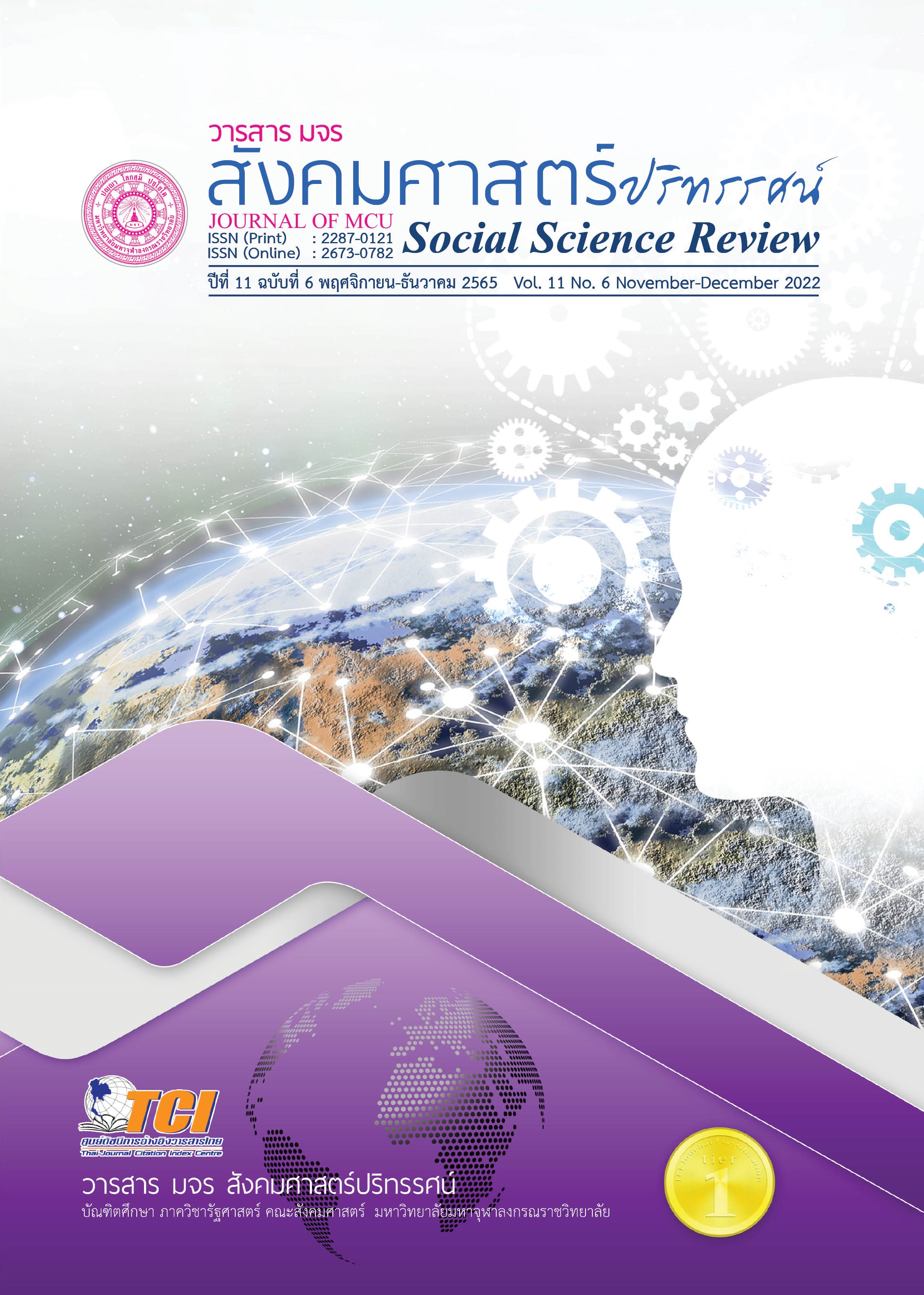การพัฒนาข้อเสนอเชิงนโยบายการเสริมสร้างสมรรถนะนักจัดการเรียนรู้สู่นโยบายข้าราชการดิจิทัล ของสำนักงานคณะกรรมการการศึกษาขั้นพื้นฐาน
คำสำคัญ:
นักจัดการเรียนรู้, ข้าราชการดิจิทัล, สมรรถนะบทคัดย่อ
บทความวิจัยนี้มีวัตถุประสงค์เพื่อ 1) พัฒนาโปรแกรมเสริมสร้างสมรรถนะนักจัดการเรียนรู้สู่นโยบายข้าราชการดิจิทัล และ 2) พัฒนาข้อเสนอเชิงนโยบายของการเสริมสร้างสมรรถนะ มี 2 ขั้นตอน คือ 1) การตรวจสอบความเป็นไปได้เชิงการนำไปปฏิบัติจริง ด้วยวิธีการจัดสนทนากลุ่ม จำนวน 17 คน และ 2) การหาฉันทามติจากผู้บริหารระดับนโยบายด้านการศึกษา จำนวน 5 คน โดยใช้หลักค่าสัมประสิทธิ์แคปปาของโคเฮนและการปรึกษาหารือสาธารณะ
ผลการวิจัยพบว่า 1) โปรแกรมซึ่งประกอบด้วย กรอบแนวทางการพัฒนา PAME Model กระบวนการพัฒนา AUD Proces และกลไกการพัฒนา DIGIT Technic มีความเป็นไปได้เชิงการนำไปปฏิบัติจริง และ 2) โปรแกรมมีความเหมาะสมและความเป็นไปได้เชิงนโยบาย ซึ่งทุกฝ่ายมีความเห็นพ้องต้องกันอยู่ในระดับ 0.647 โดยมีข้อเสนอเชิงนโยบายภายใต้ห่วงโซ่คุณค่า ได้แก่ 1) ต้นทาง คือ การพัฒนาผู้นำและต้นแบบ ด้วยแผนพัฒนารายบุคคลสู่ความเป็นเลิศภายใต้เป้าหมายการเติบโต 2) กลางทาง คือ การสร้างระบบนิเวศทางการเรียนรู้ให้มีความสมดุล ท้าทาย และกระตุ้นการพัฒนาอย่างต่อเนื่อง และ 3) ปลายทาง คือ การยกระดับขีดสมรรถนะองค์การแห่งการเรียนรู้สู่การสร้างสรรค์นวัตกรรม
เอกสารอ้างอิง
พัชรกันย์ เมธาอัครเกียรติ และประสพชัย พสุนนท์ (2561). ปัจจัยที่ส่งผลต่อการเป็นองค์การแห่งการเรียนรู้ของสำนักงานคณะกรรมการการศึกษาขั้นพื้นฐาน. Veridian E-Journal ฉบับมนุษยศาสตร์สังคมศาสตร์และศิลปะ, 11(1), 1944-1960.
วสันต์ สุทธาวาศ และคณะ. (2559). การพัฒนาโปรแกรมเสริมสร้างศักยภาพความเป็นนวัตกรการศึกษา. Veridian E-Journal ฉบับมนุษยศาสตร์ สังคมศาสตร์ และศิลปะ, 9(2), 194-215.
วสันต์ สุทธาวาศ และประสพชัย พสุนนท์. (2558). ปัจจัยที่ส่งผลต่อพฤติกรรมสร้างนวัตกรรมระดับบุคคลในสำนักงานคณะกรรมการการศึกษาขั้นพื้นฐาน. Veridian E-Journal ฉบับมนุษยศาสตร์ สังคมศาสตร์ และศิลปะ, 8(1), 530-545.
สำนักงานรัฐมนตรีกระทรวงศึกษาธิการ. (2564). นโยบายและจุดเน้นของกระทรวงศึกษาธิการ ปีงบประมาณ พ.ศ. 2564. กรุงเทพฯ: กระทรวงศึกษาธิการ.
สำนักงานเลขาธิการสภาผู้แทนราษฎร. (2559). ภาครัฐไทยกับการก้าวเข้าสู่รัฐบาลดิจิทัล. กรุงเทพฯ: สำนักวิชาการ สำนักงานเลขาธิการสภาผู้แทนราษฎร.
สำนักงานเลขานุการของคณะกรรมการยุทธศาสตร์ชาติ. (2562). ยุทธศาสตร์ชาติ พ.ศ. 2556-2561. กรุงเทพฯ: สำนักงานคณะกรรมการพัฒนาการเศรษฐกิจและสังคมแห่งชาติ.
สำนักงานสภาพัฒนาการเศรษฐกิจและสังคมแห่งชาติ. (2564). ร่างแผนพัฒนาเศรษฐกิจและสังคมแห่งชาติ ฉบับที่ 13 (พ.ศ. 2566-2570). สืบค้น 12 สิงหาคม 2564, จาก https://www.nesdc.go.th/download/document/Yearend/2021/plan13.pdf
สำนักนโยบายและแผนการศึกษาขั้นพื้นฐาน. (2564). นโยบายสำนักงานคณะกรรมการการศึกษาขั้นพื้นฐาน ปีงบประมาณ พ.ศ. 2564-2565. กรุงเทพฯ: สำนักงานคณะกรรมการการศึกษาขั้นพื้นฐาน, กระทรวงศึกษาธิการ.
Anderson, L., & Krathwohl, D. A. (2001). Taxonomy for Learning, Teaching and Assessing: A Revision of Bloom’s Taxonomy of Education Objective. New York: Longman.
Arena, M., et al., (2017). How to catalyze innovation in your organization. MIT Sloan Management Review, 58(4), 39–47.
Attewell, P. (1992). Technology diffusion and organizational learning: The case of business computing. Organization Science, 3(1), 1–19.
Bandura, A. (1977). social cognitive theory. Englewood Cliffs, New Jersey: Prentice-Hall
Bolles, R. C. (1975). Learning Theory. New York: Holt Rinehart and Winston.
Ceipek, R., et al., (2019). Technological Diversification: A Systematic Review of Antecedents, Outcomes and Moderating Effects. International Journal of Management Reviews, 21, 466–497.
Choi, J.N. & Chang, Y.J. (2009). Innovation implementation in the public sector: an integration of institutional and collective dynamics. Journal of Applied Psychology, 94(1), 245–253.
Drucker, P. F. (1998). The Coming of the New Organization. Harvard Business Review of Knowledge Management. Boston: Harvard Business School Publishing Corporation.
Garvin, D. A. (1993). Building a Learning Organization. Harward Business Review, 71(1), 778-779.
Morgan, D. L. (1998). The Focus Group Guidebook: Focus Group Kit. Volume 1. ThousandOaks. CA: Sage.
Pan F., et al. (2021). Platform diffusion at temporary gatherings: Social coordination and ecosystem emergence. Strategic Management Journal. Strat Mgmt J. 2021(42), 233–272.
Rezabek, Roger. (2000). Online Focus Groups: Electronic Discussions for Research. Forum:Qualitative Social Research, 1(1), Art.18, Retrieved from https://shorturl.asia/M5FA4
Robbins, S. P. (1990). Organization Theory: Structure Design and Application (3rd ed). New Jersey: Prentice-Hall.
Senge, P.M. (1990). The Fifth Discipline: The Art and Practice of the Learning Organization. New York: Doubleday.
Vakili, K. & Sarah, K. (2020). Organizing for innovation: A contingency view on innovative team configuration. Strategic Management Journal. Strat MgmtJ. 2020(410), 2010–2019.
Wu, L., et al., (2018). Large teams develop and small teams disrupt science and technology. Nature, 566(7744), 378–382.
Yuan, F. & Woodman, R. W. (2020). The multiple ways of behaving creatively in the workplace: A typology and model. Journal of Organizational Behavior, 42(1), 20-33.
ดาวน์โหลด
เผยแพร่แล้ว
รูปแบบการอ้างอิง
ฉบับ
ประเภทบทความ
สัญญาอนุญาต
ลิขสิทธิ์ (c) 2022 วารสาร มจร สังคมศาสตร์ปริทรรศน์

อนุญาตภายใต้เงื่อนไข Creative Commons Attribution-NonCommercial-NoDerivatives 4.0 International License.
เพื่อให้เป็นไปตามกฎหมายลิขสิทธิ์ ผู้นิพนธ์ทุกท่านต้องลงลายมือชื่อในแบบฟอร์มใบมอบลิขสิทธิ์บทความให้แก่วารสารฯ พร้อมกับบทความต้นฉบับที่ได้แก้ไขครั้งสุดท้าย นอกจากนี้ ผู้นิพนธ์ทุกท่านต้องยืนยันว่าบทความต้นฉบับที่ส่งมาตีพิมพ์นั้น ได้ส่งมาตีพิมพ์เฉพาะในวารสาร มจร สังคมศาสตร์ปริทรรศน์ เพียงแห่งเดียวเท่านั้น หากมีการใช้ภาพหรือตารางหรือเนื้อหาอื่นๆ ของผู้นิพนธ์อื่นที่ปรากฏในสิ่งตีพิมพ์อื่นมาแล้ว ผู้นิพนธ์ต้องขออนุญาตเจ้าของลิขสิทธิ์ก่อน พร้อมทั้งแสดงหนังสือที่ได้รับการยินยอมต่อบรรณาธิการ ก่อนที่บทความจะได้รับการตีพิมพ์ หากไม่เป็นไปตามข้อกำหนดเบื้องต้น ทางวารสารจะถอดบทความของท่านออกโดยไม่มีข้อยกเว้นใดๆ ทั้งสิ้น





